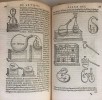GIROLAMO (Cardano).
De Subtilitate Libri XXI. Nunc demum ab ipso autore redogniti, atque perfecti.
Lyon, Guillaume Rouillé, 1559. 1559 1 vol in-12° de : 718 pp., [28] ff.(index). Erreurs de pagination. Nombreux bois sculptés, diagrames geomériques, astrologiques. Devise de l'imprimeur sur la page de titre (lugdunu, in virtute et fortuna). Plein vélin ancien (restauré), dos lisse. (Provenance: ex-dono manuscrit en page de garde, en dessous: ex-libris gravé Dr François Moutier, et plusieurs ex-libris manuscrits et annotations sur le titre).
Reference : 4388
Vaste et audacieuse encyclopédie à la fois archaïque et visionnaire des connaissances de son temps due à litalien Girolamo Cardano dit Caran (1501-1576) uvre complète des sciences naturelles, considérée comme la présentation la plus avancée de la connaissance physique jusqu'à son époque. Girolamo Cardano était un éminent philosophe de la Renaissance italienne, à la fois mathématicien, médecin, biologiste, physicien, chimiste, astrologue, astronome, philosophe. Souvent considéré comme le plus grand mathématicien de la Renaissance, Cardano fut l'un des fondateurs de la théorie des probabilités (inspiré par sa passion pour les jeux de cartes et les dés) et le premier à introduire les coefficients binomiaux et le théorème binomial dans le monde occidental. Aujourd'hui, la renommée de Cardano repose principalement sur ses réalisations en algèbre, y compris la première utilisation systématique des nombres négatifs, et l'utilisation implicite des nombres complexes dans son plus grand travail mathématique Ars Magna (1545), où il a utilisé des racines carrées de nombres négatifs les équations cubiques. De Subtilitate Libri XXI, écrit dans un latin elliptique et souvent obscur, contient un peu de tout: de la cosmologie à la construction des machines; de l'utilité des sciences naturelles à l'influence des démons; des lois de la mécanique à la cryptologie. C'est une mine de faits, à la fois réels et imaginaires, de notes sur l'état des sciences, de la superstition, de la technologie, de l'alchimie et de diverses branches de l'occulte. Les similitudes entre les opinions scientifiques exprimées par Cardano et celles de Léonard de Vinci, à cette époque inédites, ont conduit certains historiens, en particulier Pierre Duhem, à supposer que Cardano avait utilisé les notes manuscrites de Léonard. Louvrage est illustré de nombreux diagrammes et schémas dinstruments de chimie dans le texte et parfois dans les marges. Provenance: ex-dono manuscrit en page de garde, en dessous: ex-libris gravé Dr François Moutier, et plusieurs ex-libris manuscrits et annotations sur le titre. 1 vol in-12° of: 718 pp., [28] ff. (index). Paging errors. Numerous carved woods, geometric and astrological diagrams. Printer's motto on the title page (lugdunu, in virtute et fortuna). Full old vellum (restored), smooth spine. (Provenance: handwritten ex-dono on flyleaf, below: engraved ex-libris Dr François Moutier, and several handwritten ex-libris and annotations on the title). Early edition of this vast and daring encyclopaedia at once archaic and visionary of the knowledge of his time due to the Italian Girolamo Cardano known as Cardan (1501-1576) complete work of the natural sciences, considered as the most advanced presentation of the physical knowledge to his time. Girolamo Cardano was an eminent philosopher of the Italian Renaissance, a mathematician, a physician, a biologist, a physicist, a chemist, an astrologer, an astronomer and a philosopher. Often considered the greatest mathematician of the Renaissance, Cardano was one of the founders of probability theory (inspired by his passion for card games and dice) and the first to introduce binomial coefficients and the binomial theorem in The Western world. Today, Cardano's fame rests primarily on his achievements in algebra, including the first systematic use of negative numbers, and the implicit use of complex numbers in his greatest mathematical work Ars Magna (1545), where he used square roots of negative numbers cubic equations. De Subtilitate Libri XXI, written in an elliptical and often obscure Latin, contains a bit of everything: from cosmology to the construction of machines, from the utility of the natural sciences to the influence of demons, from the laws of mechanics to cryptology is a mine of facts, both real and imaginary, notes on the state of science, superstition, technology, alchemy and various branches of the occult. between the scientific opinions expressed by Cardano and those of Leonardo da Vinci, at that time unpublished, led some historians, especially Pierre Duhem, to suppose that Cardano had used the handwritten notes of Leonardo. The book is illustrated with numerous diagrams and shemas of chemical instruments in the text and sometimes in the margins.
Bookseller's contact details
J-F Letenneur Livres Rares
M. Jean-François Letenneur
11 bd du tertre Gondan
35800 Saint Briac sur Mer
France
librairie@jfletenneurlivresrares.fr
06 81 35 73 35
 Write to the booksellers
Write to the booksellers





